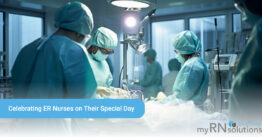
It’s Never Too Late To Start
Renee Hibma’s unique journey in nursing began in the early 1990s at the University of Tennessee. She started nursing school at the age of 37 with the end goal of continuing into Nurse Practitioner (NP) training.
Her career started as a Med-Surgical Nurse. “I was just like everyone else. I think everyone starts in the Medical-Surgical Unit.” Renee also gained experience in the Emergency Department and Intensive Care Unit.
“Because I was older, I jumped at the opportunity to gain as much experience as I could. I believe my past experiences helped prepare me and I think people may have trusted me more because I was older.”
Nurse Practitioner Training
Renee was accepted into NP training at the University of Tennessee for the next two years and experienced a brutally hard workload. “I went to NP school in the morning. Immediately after school, I worked from 11 am to 7 pm in an outpatient surgical unit. After work, I studied, slept and repeated the same thing day after day.” Another hurdle to overcome was Renee’s own health. She was diagnosed with Multiple Sclerosis as she started NP school. Despite attending full time, working full time and being hampered with the fatigue of Multiple Sclerosis Renee graduated in two years. What perseverance, focus and dedication!
Her first role as a Nurse Practioner was working in family practice. She noted a few things while working in that setting. 1) You need to know the basics that they teach in school; the knowledge base is vital. 2) Soak up as much of the practical application in your clinicals from your preceptor. This is where you begin to combine the “book learning” with a practical assessment of the patient. 3) Be an excellent listener. Yes, read the chart before you enter the room but don’t let that determine your plan of treatment. The key is matching what the patient is subjectively telling you and discernment in using your NP knowledge to determine the best treatment plan.
Burnout is Real
Renee’s advice to an RN or NP to decrease the chance of burnout is simple. “Practice self-care. You can’t provide compassionate care if you are empty yourself. Resting is key.”
Enjoy a massage, reading, listening to music or exercise. Share a meal and good conversation with friends. Just remember that resting is work that needs to be done.
Medical administrators realize that they need to educate their clinicians on self-care. “Over the years administration has put more focus on luncheons, offering massages, and more flexible work time to offset clinician burnout.” Click here to read more about job burnout and its consequences.
Career Options
If you are a nursing student thinking about becoming a Nurse Practitioner, Renee suggests starting on the Medical-Surgical floor. It gives a nurse a well-rounded base of the post-operative, orthopedic and neurological, and cardiac patient experience. Gaining a broad base will help you decide if you want to specialize. Plus, it provides you with a broad base of experience that will only aid patient care within your specialty.
Renee says, “If you want to go into Administration once you have some clinical experience, there is a huge need for good clinical supervisors and managers.”
After approximately 15 years in family practice, Renee stepped away from full-time Nurse Practitioner roles and worked in legal nursing and home health/hospice administration.
Conclusion
Renee certainly embodied a strong dedication to providing compassionate care. Her story of nursing and how becoming an NP is possible even as a second career is inspiring. “Nursing and NP offers so many different careers outside the traditional patient care experience, I encourage everyone to give the field a try.”
If you are just starting your career as a Registered Nurse or Nurse Practioner, follow this advice:
- Be compassionate. Your patients just want to know that you care.
- Be a great listener. Your education is important, but your patient holds the key to understanding what is wrong.
- Being an RN or NP is a calling. It must be more than just a paycheck.
- Be organized.
- Charting is NOT more important than the patient.
Find the Right Job in the Right Place
Looking for a new job? We specialize in connecting nurses with jobs they love. Contact myRN Staffing Solutions for more information about jobs in your area.










Write a comment: